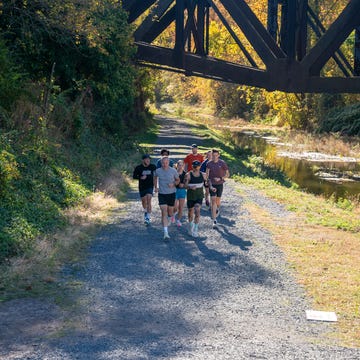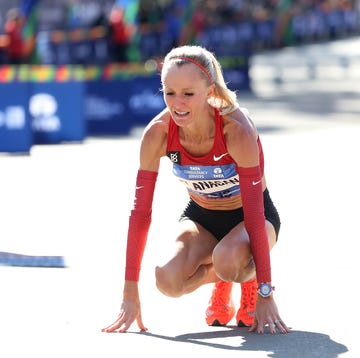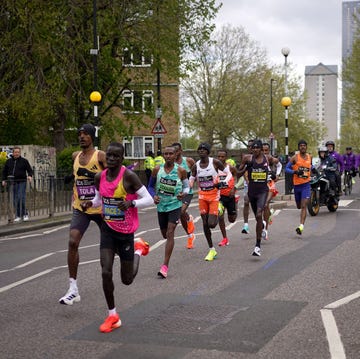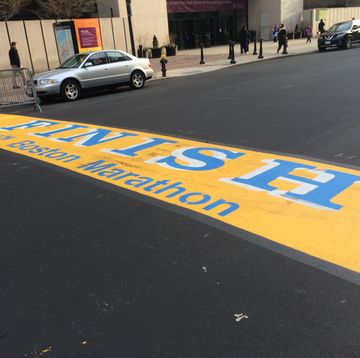A Part of Hearst Digital Media. Anton (Tony) Krupicka (pronounced "krew-PITCH-kuh") is one of those people. I first met him at the beginning of the Estes Park Marathon in June 2006. Perhaps it was his long hair and scraggly beard--making him look like a very fast hippy--that made him stand out from the five-man lead pack as we took off from the starting line of the nation's highest paved marathon. Maybe it was his ultra-minimalist approach: He wore only a beat-up pair of Nike waffle racers and frayed split shorts. Maybe it was his young, energetic brashness: I remember talking with him about the benefits of going light; that is, until he dusted our group before mile two. He went on to win the race in what remains the course record of 2:45:02.
Two months later, when I showed up to pace a friend at the Half Moon checkpoint, about three-quarters into the Leadville Trail 100, there was a palpable buzz about some young gun who was ripping up the course, leading second place by almost two hours. When I heard that people were calling him "Tarzan," I suspected he was my man Krupicka from the Estes race. Sure enough, Krupicka soon ran by in his signature style, bare-backed with his long hair flowing behind him in the mountain air. He ended up blowing away the field, winning in the second-fastest time ever. A year later, having won Leadville again 45 minutes faster than in 2006, people are starting to know his name, although for most purposes, "Tarzan" will do.
Like the fictional Edgar Rice Burroughs hero, this ardent 24-year-old seeks to "strip off the thin veneer of civilization," and not just clothing. He not only looks the part of Tarzan--tan, athletically built with the body fat percentage seen on many a milk carton and preferring to wear little more than Tarzan's loincloth--he also chooses sleeping spots not too different than Tarzan's tree perches.
The night before his first Leadville race he spent in a public restroom. This year, he ended up on a soccer pitch, complete with a drunken harmonica player to keep him awake. Not that Krupicka has an affinity for sleeping in such spots--he explains that he's just too cheap to spend the money for a hotel room and is irresponsible enough about that sort of thing that he wouldn't have booked a room early enough in advance anyway, because Leadville fills up long before race weekend.
This year, finding a "Closed Due to Vandalism" sign on last year's "surprisingly clean" restroom, Krupicka, girlfriend Jocelyn Jenks, and pacer Kyle Skaggs pitched a tent on the soccer field in the park. "Easy cheesy," says Krupicka. "I don't know. It just worked." Other than the drunken harmonica player, that is.
Homegrown in Nebraska
Krupicka credits his minimalist philosophy and environmental bent to his upbringing in northeastern Nebraska. He grew up in Niobrara (population 400, on the South Dakota border), where his father, Ron, raises livestock and farms cattle feed, and his mother, Liz, teaches in the local high school. He says his father taught him the importance of thinking, reading, questioning, and learning. His dad spent nearly 20 years working for a non-profit called the Center for Rural Affairs where he directed the Small Farm Energy Project, which was trying to get farmers to use alternative sustainable energy resources and practices as a way of being more relevant and economically viable. "Growing up on the farm with my family absolutely instilled in me the sort of land ethic that I think is so valuable," he says. "I'm really pretty unoriginal--I'm probably mostly a clone of my dad."
The Krupicka family heats its home with a woodstove, uses an outhouse, pumps water from a well with a windmill, tends three enormous gardens and an orchard and keeps a root cellar for storing produce over the winter. "(All these things) were the norm for me growing up and I didn't realize how outside the 'mainstream' or how revolutionary and 'back to the land' they were considered until I went to college," Krupicka says. "It's not like I grew up in the Stone Age or anything, it's just that I grew up with a family that was committed to being mindful of one's impact and place within the larger natural environment and having an intense appreciation for that environment."
Krupicka started running as a sixth-grader, training for the mile run as part of the Presidential Physical Fitness Test in gym class. That effort quickly blossomed to running his first marathon at age 12. He found his running "morphed into a lot more" after he began reading tons of old 1970s running literature he found at the Goodwills, thrift stores, and used bookstores that his family frequented.
"I stumbled onto a second edition copy of Arthur Lydiard's "Run to the Top" and his base training philosophy and marathon training for every distance credo had me thinking I should be doing 100-mile weeks and 22-mile Sunday runs," he says. "So I did, because there was no one to tell me not to--and it was a hell of a lot of fun."
Krupicka has always loved running in Nebraska because of the unending miles of rolling, soft dirt roads and seemingly endless acres of rugged pastureland to explore. He cherishes his runs on an old doubletrack trail in the pastures that climb out of the Missouri River Valley and into the hills behind his family's farm. He calls the stretch the "Ethiopian Trail" because it reminds him of the trail that Haile Gebrselassie ran at the start of the movie, "Endurance."
Early on, Krupicka, "like every male Nebraskan child," aspired to be the consummate three-sport athlete: football, basketball, and track. But through sixth and seventh grades Krupicka's obsession with running increased. His high school, however, didn't have a cross country team, so he successfully petitioned the school board to start one. Though he went out for the football team as a freshman and the basketball team as a sophomore, he missed most of the season with injuries incurred from running 90-mile weeks in conjunction with practicing the other sports.
"Running was absolutely not cool growing up in Nebraska," he admits. "Is it cool growing up anywhere? Maybe Boulder. Or Eugene. However, if you were a good distance runner on the track team, you definitely became cool. That finally happened my senior year when I had a pretty solid track season (and only lost once or twice). But by then I was so disillusioned with my peers that it didn't matter. Running was my identity and escape as long as I've done it. When I was hating everyone I went to school with, it was OK because I was cooler than they were (in my mind) because I was running to and from school every day (a 14-mile roundtrip) or because I could go crank out a 20-miler on the weekends."
His parents didn't know anything about long-distance running, but they appreciated that he showed determination from a young age. "The ceiling of his bedroom still has posters of runners like Matt Carpenter and inspirational sayings all over it," his mom says. His dad also speaks of his son's dedication and steadfast pursuit for running with a twinkle in his eye; his support of Tony's efforts includes driving 650 miles from Niobrara to the finish of the Leadville 100 in August to see Tony win for the second year in a row.
Krupicka is very appreciative of the support that his parents and two sisters have given him from the very start. "I think in the beginning my parents didn't know enough about what I was doing and attempting to realize that, wow, jeez, maybe a 12-year-old shouldn't run a marathon, but again, I think that was much, much better than them trying to limit me because they'd bought into some Runner's World propaganda. They often remind me that balance is important in life, but I don't view that as them not supporting my running--that's just them supporting me as a human being and son and is completely necessary as a good parent."
Chafing at Coaches
In 2001, Krupicka enrolled at Colorado College in Colorado Springs, a highly respected Division III school known for its "block" system of intense single-subject studies and for its outstanding hockey program. Unfortunately, he was injured with stress fractures in his first years on the cross country and track teams and never put in a solid season.
"I would always have a great summer of 100 to 130 miles per week base training at home in Nebraska and come into the season way more fit than almost anyone else," he says. "But after about a month of races and twice-weekly speed workouts, I would be completely burned and be racing like shit. It was very, very frustrating." His 8K cross country PR ended up being a pedestrian 27:32 and his best 5K (16:31) still dates back to his high school days. "Pretty f-ing pathetic," he says.
Krupicka attributes his lack of performance in college to the fact that he would typically reach peak fitness by running no more than one speed workout per week--something that conflicted with CC's training program.
"And, truth be told, there were lots of other things I was doing wrong in my training," he says. "Namely, throughout most of college, I was of the opinion that, even at 6,000 feet above sea level, anything slower than 7-minute per-mile pace wasn't doing me any good, so I was always going way, way too hard on easy days, and in retrospect, way too hard on hard days, too. So, races were predictably shit. Now, I'm almost certain I could PR in the 5K or 10K and the vast majority of my running is at 8-minute pace or slower."
Since college, Krupicka's running has become, as he puts it, "more intuitive and personal." He says he's always grated against his coaches, in both high school and college. Really, it came down to the fact that running is the one thing in his life for which he does not accept or solicit advice. "I will not have someone tell me how to run," he says. "For me, it's all about the journey and the process and not really some end-goal to be achieved by some predetermined structure, so the idea of a coach just doesn't fit into that, obviously."
Running Long
It is unusual for a youngster to be interested in ultramarathons, but Krupicka isn't exactly your "usual" young man. His interest in ultras was born, as he tells it, out of sheer curiosity and fascination of the human body's ability to run so far. In high school, his three favorite runners were Ann Trason, Scott Jurek, and Matt Carpenter. "I remember when Scott won his first Western States 100 when he was 24 or something like that and I read that he ran his first 50-miler when he was 20 or 22. I wanted to be sure to have run my first 50-miler by the time I was that old...He was definitely an inspiration."
Krupicka wondered how difficult it would be to run for 17 hours because he had only run for a little over three hours at the time. He explains that this curiosity, coupled with a sheer joy and love for running, has been his prime motivation ever since.
During the summer of 2004, while doing astrophysics research at the U.S. Naval Observatory in Flagstaff, AZ, he ran a couple 30-milers just to explore some of the trails. In his last week there, he decided to see how much he could run in seven days. It ended up being 183 miles, which piqued his interest in running even bigger miles.
He quit his college track team the following spring , due to a minor ankle injury that wouldn't allow him to run the curves, and started running 200 miles per week. He kept that up, with a 30-miler and 40-miler thrown in, until the middle of July when his foot started hurting and he had to back down.
As the summer of 2006 approached, he was planning on running the Pikes Peak Marathon. But, after winning the Leadville Trail Marathon and the High Mountain Institute 50K in Leadville, everyone assumed he was doing the 100-miler. John O'Neill, the manager at the Colorado Running Company in Colorado Springs, questioned him persistently about signing up for the 100. "I just kept telling him he was crazy," Krupicka recalls.
He had applied for a competitive entry for the Pikes Peak Marathon, but because he didn't have a phone and his email address got misconstrued, the marathon committee had a hard time getting ahold of him to tell him it would give him a comped entry. Krupicka just assumed that he hadn't gotten in and decided, "What the heck, I'll give this 100 mile thing a shot."
So three weeks before the race, he drove to Leadville to check out the course and ran the first half from Leadville to Winfield a few minutes under Carpenter's 2005 record pace.
"Even though that was by far the longest run I'd ever done (time or distance), I figured that was a pretty good sign, so I sent in my $200-plus entry fee and application," he recalls. "Of course, a couple days after that the [Pikes Peak] marathon committee finally got ahold of me and told me I was in. But I didn't want to waste my $200, so I decided to just go ahead and do the 100. It all worked out in the end."
Running Happy
"Anton typifies the young and new breed of runner," says Buzz Burrell, manager of the La Sportiva Mountain Running Team. "They aren't running to work off their inner angst or pain. They don't have their heads down, grinding out the numbers, substituting mental calculations for movement. They don't think that suffering is noble or pain somehow makes you a better person. They already are good people, they have their heads up, and they run as an expression of joy and freedom. You can actually see the ease in Anton's running form, and you feel good when he goes by you."
Krupicka seeks to live his life as "in-the-moment," distilled, and without distractions or clutter as possible. To him the act of running through the mountains and woods has the effect of refining it all down to the point that he achieves a mode of existence where he feels more intimately integrated into his natural environment. It is then that he feels his mind is sharp and his purpose of efficient running is clearly defined.
That, more than anything, is why he says he wakes up every morning excited to be on the trails all day. "Because I love the effortlessness that sometimes occurs while cruising down a cushy pine-needle singletrack or even while grinding up a switchback above tree line," he says. "And I love how I can run up and into a mountain cirque or over a pass and be completely dwarfed and humbled by the sheer immensity and grandiosity of the landscape and I love flying down the other side with the breeze in my hair and the gravel in my shoes and the burning in my quads and the branches in my face and then when I'm finally all worn out there's nothing like peeling my shoes off and just sitting. Just being at rest. Running sharpens the focus on life and intensifies the emotions. Is there any better reason to do anything?"
Running plays an enormous, some might say, all-consuming part in Krupicka's life. "That is what passion is, though," Krupicka reflects. "If I could be as objective as possible, I would say it probably plays too much a part in my life, but I also believe that there are too many people out there just floating through life, just kind of getting by, or maybe they're really throwing themselves into making money and are contriving it as 'providing for their family' when it's really just the way the system is set up so that our impossible illusion of infinite economic growth can be achieved for a little while longer. So, it probably plays too much, but with an asterisk--the fact that it plays 'too much' isn't necessarily a bad thing."
Krupicka says he does try to balance running with personal relationships, like with his girlfriend, Jenks, a senior on CC's cross country and track teams.
"Tone is one of the most real people I have ever encountered," she says. "Although his bluntness can sometimes be jarring, his candid personality makes his compliments all the more sincere and his opinions much more meaningful. Putting up with Tony's inordinate amounts of running and subsequent self-induced groaning can be a test of patience. But the dedication and real love he has for placing one foot in front of the other on some rarely explored mountain trail is a part of what makes Tony the person that I so value."
Running Green
After graduating from CC in 2005 with a double major in physics and philosophy and a minor in math, Krupicka went back for another year to get a degree in geology. That's when he began developing a reputation for weird sleeping spots.
During his fifth year, he was on a limited budget and didn't want to pay rent, so for the first semester he slept under the dorm room bed of friend Julian Boggs. Neither of them had many possessions and Boggs was able to half-loft his bed to allow plenty of space for Krupicka to sleep. The second semester Krupicka switched to a different dorm, one with a key-code door lock instead of a swipe card system, so it was easy for him sneak in and out of his luxurious accommodations: the closet of friend Kiran Moorty. "The closet wasn't quite a walk-in because it had this severely slanting roof, but it did have a door, and if I laid diagonally I could fully stretch out." His home for the past year in Colorado Springs was a more traditional single-bedroom apartment, albeit with no furniture.
Last year, Krupicka worked as a tutor in the writing center on campus. "I got $20K for 10 months, plus health care," he reports. "Not a bad gig, and I got to hang out with Jocelyn for another year." This past summer, he spent most of his time running. Currently, he is a grad student and research assistant at Montana State University in Bozeman, where he's pursuing a master's degree in geology. "To just plain learn more," he explains, though admittedly not with any career path in mind.
Burrell calls Krupicka a "very intelligent, primal runner who thoughtfully strips life down to its raw essentials. And if you ask him about it, instead of a brush-off or a series of grunts, you suddenly find yourself in the delightful company of one of the most thoughtful, articulate, and self-aware persons you've ever had the pleasure to meet."
Krupicka doesn't have a phone and generally believes that technology is not the answer to much in life. "We never know how fixing a problem with technology is going to further f– up the biosphere. Instead of turning to technology to make our egregious and out-of-touch lifestyles possible, we should--as much as we are willing or possible--try to live more in line with the natural world, more 'primitively' maybe, so that the technology and disturbance isn't necessary. Not only will lots of harm be avoided, but we'll probably be happier and more fulfilled as individuals, too."
Krupicka shows no bias toward his Nebraska-bred or corn-fed roots when he declares, in response to questions about environmental problems, "Ethanol is not the freakin' answer. Electric/gas hybrids are not the answer. Not driving your goddamned car is the answer. Of course, it's also all about balance and compromise and realizing that there are varying degrees of changing your lifestyle.
"I have no desire to be Gandhi and only eat rice and weave my own clothing, but there are a lot of things about our current collective culture and way of life that are seriously f–ed up and maybe we should just step back for a second and reconsider: Is the impact of this worth the damage, or even reasonable considering the other ways there are for achieving this certain end?
"People become accustomed to a certain way of life and never stop to question it until there are no more glaciers left or the grizzlies are gone, etc. It comes down to placing a value on the natural world and harboring an ethic towards it the way that up until now we've harbored towards our right to make as much goddamned money as we damn well please because this is America and capitalism is a god-given right. Well, I say it's morally wrong to glorify ourselves so much while stomping all over all sorts of stuff that would like to just plain have a fighting chance at existence as well."
With monologues like that, Krupicka admits people might think of him as self-righteous, but he's OK with that. One of the benefits that Krupicka recognizes as coming with winning races and gaining a voice is that he now has the opportunity to make people think a little about how they're living their lives and how they might live differently and what is possible or impossible in terms of running performance. He'd like some of his races to inspire some person somewhere to think, "Christ, he just took that to a whole new level...he wasn't trammeled by conventional wisdom there...maybe I should try a new, different approach...maybe I can do more than I thought or live differently than I thought."













